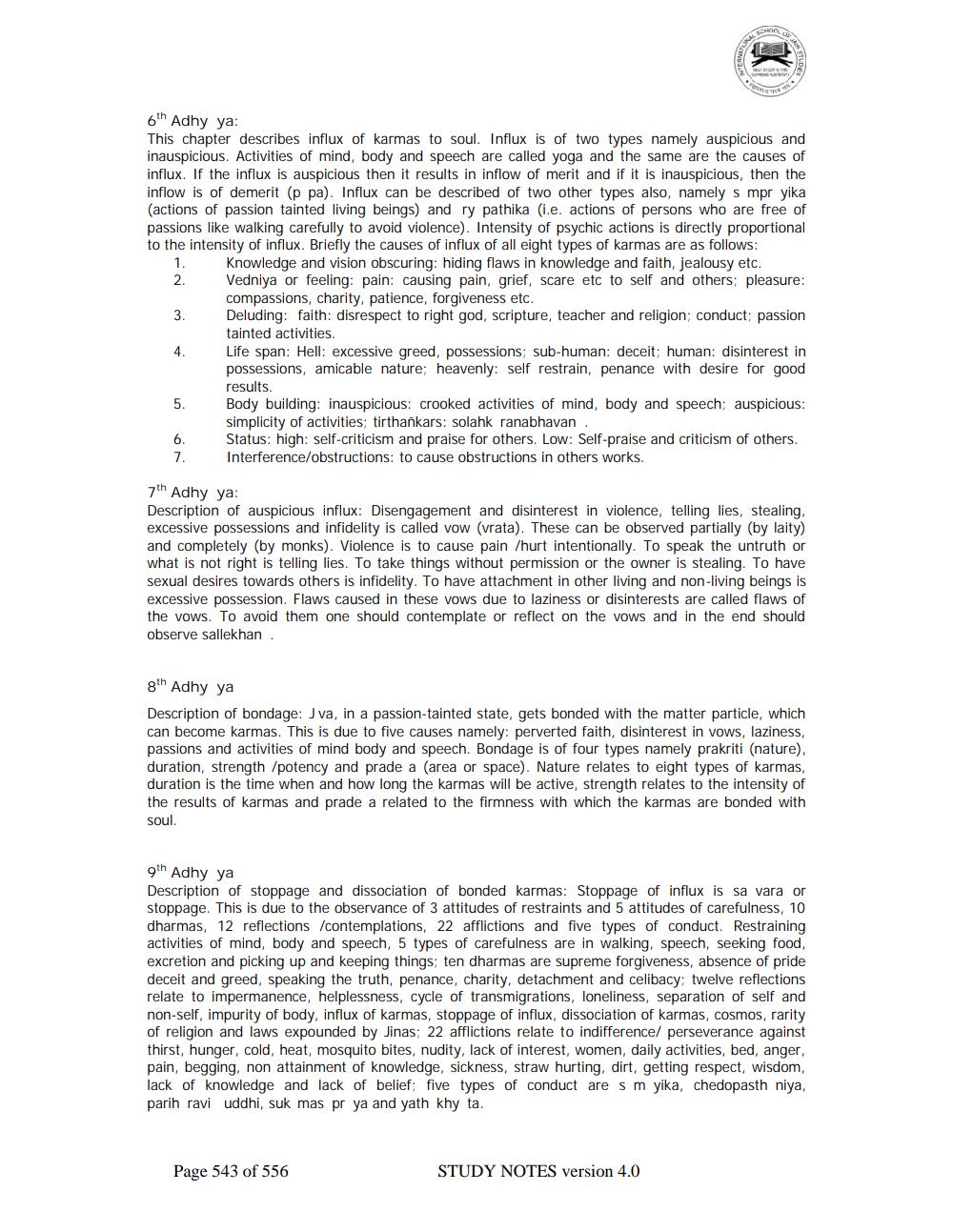________________
6th Adhy ya:
This chapter describes influx of karmas to soul. Influx is of two types namely auspicious and inauspicious. Activities of mind, body and speech are called yoga and the same are the causes of influx. If the influx is auspicious then it results in inflow of merit and if it is inauspicious, then the inflow is of demerit (p pa). Influx can be described of two other types also, namely s mpr yika (actions of passion tainted living beings) and ry pathika (i.e. actions of persons who are free of passions like walking carefully to avoid violence). Intensity of psychic actions is directly proportional to the intensity of influx. Briefly the causes of influx of all eight types of karmas are as follows:
1.
2.
Knowledge and vision obscuring: hiding flaws in knowledge and faith, jealousy etc. Vedniya or feeling: pain: causing pain, grief, scare etc to self and others; pleasure: compassions, charity, patience, forgiveness etc.
Deluding: faith: disrespect to right god, scripture, teacher and religion; conduct; passion tainted activities.
3.
4.
5.
6.
7.
Life span: Hell: excessive greed, possessions; sub-human: deceit; human: disinterest in possessions, amicable nature; heavenly: self restrain, penance with desire for good results.
Body building: inauspicious: crooked activities of mind, body and speech; auspicious: simplicity of activities; tirthankars: solahk ranabhavan.
Status: high: self-criticism and praise for others. Low: Self-praise and criticism of others. Interference/obstructions: to cause obstructions in others works.
7th Adhy ya:
Description of auspicious influx: Disengagement and disinterest in violence, telling lies, stealing, excessive possessions and infidelity is called vow (vrata). These can be observed partially (by laity) and completely (by monks). Violence is to cause pain /hurt intentionally. To speak the untruth or what is not right is telling lies. To take things without permission or the owner is stealing. To have sexual desires towards others is infidelity. To have attachment in other living and non-living beings is excessive possession. Flaws caused in these vows due to laziness or disinterests are called flaws of the vows. To avoid them one should contemplate or reflect on the vows and in the end should observe sallekhan.
8th Adhy ya
Description of bondage: Jva, in a passion-tainted state, gets bonded with the matter particle, which can become karmas. This is due to five causes namely: perverted faith, disinterest in vows, laziness, passions and activities of mind body and speech. Bondage is of four types namely prakriti (nature), duration, strength /potency and prade a (area or space). Nature relates to eight types of karmas, duration is the time when and how long the karmas will be active, strength relates to the intensity of the results of karmas and prade a related to the firmness with which the karmas are bonded with soul.
9th Adhy ya
Description of stoppage and dissociation of bonded karmas: Stoppage of influx is sa vara or stoppage. This is due to the observance of 3 attitudes of restraints and 5 attitudes of carefulness, 10 dharmas, 12 reflections /contemplations, 22 afflictions and five types of conduct. Restraining activities of mind, body and speech, 5 types of carefulness are in walking, speech, seeking food, excretion and picking up and keeping things; ten dharmas are supreme forgiveness, absence of pride deceit and greed, speaking the truth, penance, charity, detachment and celibacy; twelve reflections relate to impermanence, helplessness, cycle of transmigrations, loneliness, separation of self and non-self, impurity of body, influx of karmas, stoppage of influx, dissociation of karmas, cosmos, rarity of religion and laws expounded by Jinas; 22 afflictions relate to indifference/ perseverance against thirst, hunger, cold, heat, mosquito bites, nudity, lack of interest, women, daily activities, bed, anger, pain, begging, non attainment of knowledge, sickness, straw hurting, dirt, getting respect, wisdom, lack of knowledge and lack of belief; five types of conduct are s m yika, chedopasth niya, parih ravi uddhi, suk mas pr ya and yath khy ta.
Page 543 of 556
STUDY NOTES version 4.0




